五年级英语下册第三单元单词(人教版)
五年级下册英语unit3知识点

五年级下册英语unit3知识点五年级下册英语unit3知识点Unit3单词Unit 3January/ˈdʒænjuər/一月February/ˈfebruər/二月March/mɑ:t/三月April/ˈeɪprə/四月May/meɪ/五月June/dʒu:n/六月July/dʒuˈlaɪ/七月August/ˈɔ:gəst/八月September/sepˈtembə(r)/九月October/ɒkˈtəʊbə(r)/十月November/nəʊˈvembə(r)/十一月December/dɪˈsembə(r)/十二月few/fˈju:/不多;很少a few 一些thing/θɪŋ/事情meet/mi:t/集会;开会sports meet运动会Easter/i:stə(r)/复活节trip/trɪp/旅行ear/jɪə(r)/年plant/plɑ:nt/种植contest/'kɒntest/比赛;竞赛the Great Wall长城national/ˈnæʃnəl/国家的National Day 国庆日American/əˈmerɪkən/美国的Thanksgiving/ˌθæŋks'ɡɪvɪŋ/感恩节Christmas/ˈkrɪsməs/圣诞节holiday/ˈhɒlədeɪ/假日;节日game/geɪm/游戏roll/rəʊl/滚动look for寻找chocolate/ˈtʃɒklət/巧克力bunny/ˈbʌni/(用作儿语)兔子RSVP(尤用于请柬)请赐复by/baɪ/在……之前Unit3必考短语常用节假日名称:New Year’s Day元旦(1.1)Tree Planting Day 植树节(3.12)Easter 复活节Ap ril Fool’s Day愚人节(4.1)May Day 劳动节(5.1)Mother’s Day母亲节(每年五月的第二个星期天) Children’s Day 儿童节(6.1)Father’s Day父亲节(每年六月的第三个星期天) Teachers’ Day教师节(9.10)China’s National Day国庆节(10.1)Mid-Autumn Day 中秋节(农历八月十五)Thanks giving Day 感恩节(11月第4个周四)Christmas圣诞节(12.25)summer vacation暑假winter vacation寒假活动名称:sports meet 运动会Easter party 复活节聚会school trip 学校旅行Chinese test 语文测试singing contest歌唱比赛birthday party生日聚会Unit3必考句型1、问答某个活动或节日在几月份的句型及答复。
人教版PEP五年级英语下册第三单元知识点、练习(含答案)
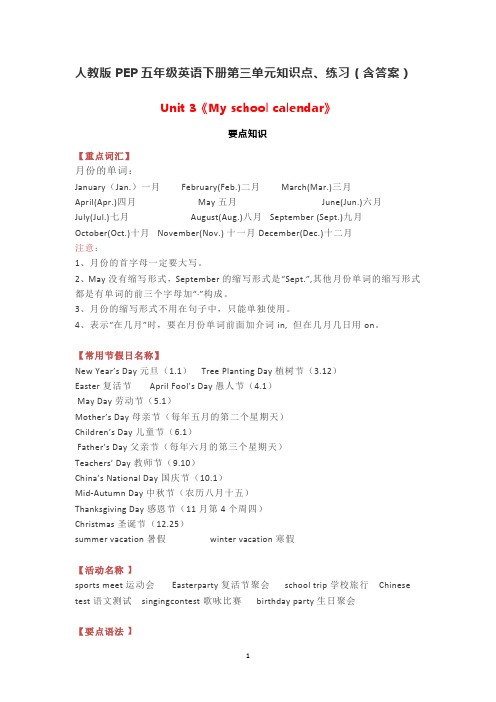
人教版PEP五年级英语下册第三单元知识点、练习(含答案)Unit 3《My school calendar》要点知识【重点词汇】月份的单词:January(Jan.)一月February(Feb.)二月March(Mar.)三月April(Apr.)四月 May五月June(Jun.)六月July(Jul.)七月August(Aug.)八月 September (Sept.)九月October(Oct.)十月 November(Nov.) 十一月 December(Dec.)十二月注意:1、月份的首字母一定要大写。
2、May没有缩写形式,September的缩写形式是“Sept.”,其他月份单词的缩写形式都是有单词的前三个字母加“·”构成。
3、月份的缩写形式不用在句子中,只能单独使用。
4、表示“在几月”时,要在月份单词前面加介词in, 但在几月几日用on。
【常用节假日名称】New Year’s Day元旦(1.1) Tree Planting Day 植树节(3.12)Easter 复活节April Fool’s Day愚人节(4.1)May Day 劳动节(5.1)Mother’s Day母亲节(每年五月的第二个星期天)Children’s Day儿童节(6.1)Father’s Day父亲节(每年六月的第三个星期天)Teachers’ Day教师节(9.10)China’s National Day国庆节(10.1)Mid-Autumn Day 中秋节(农历八月十五)Thanksgiving Day 感恩节(11月第4个周四)Christmas圣诞节(12.25)summer vacation暑假winter vacation寒假【活动名称】sports meet 运动会 Easterparty 复活节聚会 school trip 学校旅行 Chinese test 语文测试 singingcontest歌咏比赛 birthday party生日聚会【要点语法】1. 介词in 、on、at的用法。
新人教版小学五年级英语下册单词表
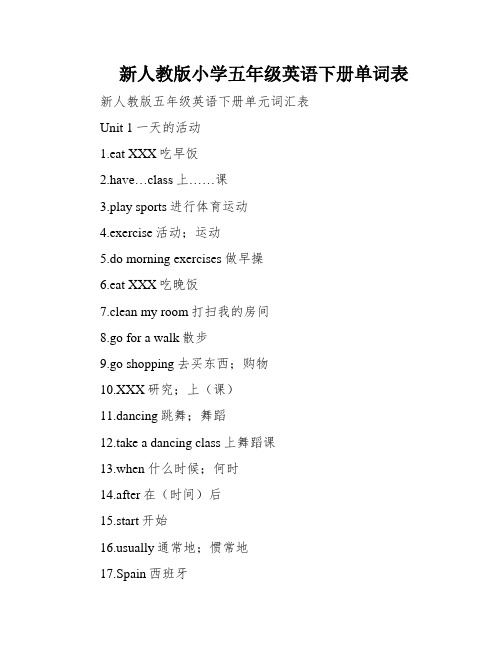
新人教版小学五年级英语下册单词表新人教版五年级英语下册单元词汇表Unit 1一天的活动1.eat XXX吃早饭2.have…class上……课3.play sports进行体育运动4.exercise活动;运动5.do morning exercises做早操6.eat XXX吃晚饭7.clean my room打扫我的房间8.go for a walk散步9.go shopping去买东西;购物10.XXX研究;上(课)11.dancing跳舞;舞蹈12.take a dancing class上舞蹈课13.when什么时候;何时14.after在(时间)后15.start开始ually通常地;惯常地17.Spain西班牙te晚;迟19.a.m.午前;上午20.p.m.午后;下午21.why为什么22.shop去买东西;购物23.work工作st上一个的;刚过去的25.sound听起来好像26.also还;也27.busy忙的28.need需求29.play戏剧;剧本30.XXX信31.live居住32.island岛33.always总是;一直34.cave岩穴;窟窿35.go swimming去游泳36.win获胜Unit 2季节及其活动1.spring春天2.summer夏天3.XXX秋天4.winter冬天5.season季节ic野餐7.go on a ic去野餐8.pick摘;采集9.pick apples摘苹果10.snowman雪人11.make a snowman堆雪人12.go swimming去泅水13.which哪个14.XXX最;最高水平地15.snow雪16.good job做得好17.because因为n假期19.all全;完全20.pink粉色;粉色的21.lovely可爱的;美丽的22.leaf(复数leaves)叶子23.fall落下;【美】秋天24.paint用颜料绘画Unit 3月份和节日1.January一月2.February二月3.March三月4.April四月5.May五月6.XXX六月7.XXX8.XXX八月9.September九月10.October十月11.XXX十一月12.XXX十二月13.few不多;很少14.a few一些15.XXX事情16.meet集会;开会17.sports XXX举动会18.Easter复活节19.trip旅行20.year年21.plant种植22.contest比赛;竞赛23.the Great Wall长城nal国家的nal Day国庆日26.American美国的27.Thanksgiving感恩节28.Christmas圣诞节29.holiday假日;节日30.game游戏31.roll滚动32.look for寻找33.chocolate巧克力34.XXX(用作儿语)兔子35.RSVP(尤用于请柬)请赐复XXX在……之前Unit4序数词1.first(1st)第一(的)2.second(2nd)第二(的)3.third(3rd)第三(的)4.fourth(4th)第四(的)5.fifth(5th)第五(的)6.XXX(12th)第十二(的)7.XXX(20th)第二十(的)enty-first(21st)第二十一(的)enty-third(23rd)第二十三(的)10.XXX(30th)第三十(的)11.special特殊的;特别的12.fool蠢人;傻瓜13.XXX小猫14.diary日记15.still仍然;依旧;还是16.noise声音;响声;噪音17.fur(某些植物的)稠密的软。
人教版五年级下册英语单词表

人教版五年级下册英语单词表人教版五年级下册英语单词表包含了学习五年级下册英语所需的词汇。
下面将详细介绍这些词汇,以帮助学生更好地理解和记忆。
1. unit (n.) 单元Example: We are studying Unit 3 in our English class.2. review (v.) 复习Example: Let's review what we learned last week.3. exercise (n.) 练习Example: Please complete the exercise on page 25.4. text (n.) 文本Example: The text says that the Earth is round.5. conversation (n.) 对话Example: Students often practice conversations in pairs.6. word (n.) 单词Example: Can you spell this word for me?7. phrase (n.) 短语Example: "How are you?" is a common English phrase.8. sentence (n.) 句子Example: Please write a sentence using this word.9. grammar (n.) 语法Example: We are learning about verb tenses in grammar class.10. pronunciation (n.) 发音Example: Repeat after me to practice your pronunciation.11. spelling (n.) 拼写Example: The spelling of this word is very difficult.12. meaning (n.) 意思Example: I don't understand the meaning of this sentence.13. write (v.) 写Example: Please write your name on the paper.14. read (v.) 阅读Example: I like to read books before bed.15. speak (v.) 说话Example: Can you speak English fluently?16. listen (v.) 听Example: Please listen carefully to the audio.17. understand (v.) 理解Example: I don't understand this math problem.18. learn (v.) 学习Example: We learn new things every day.19. study (v.) 学习Example: I need to study for my science test.20. practice (v.) 练习Example: You need to practice playing the piano every day.21. teacher (n.) 老师Example: My teacher is very kind and helpful.22. student (n.) 学生Example: There are 30 students in our class.23. classroom (n.) 教室Example: Please go to the classroom next door.24. school (n.) 学校Example: I go to school from Monday to Friday.25. pencil (n.) 铅笔Example: Do you have an extra pencil I can borrow?26. pen (n.) 钢笔Example: I like to write with a black pen.27. book (n.) 书籍Example: I borrowed a book from the library.28. notebook (n.) 笔记本Example: I write my homework in my notebook.29. ruler (n.) 尺子Example: Can I borrow your ruler for a moment?30. eraser (n.) 橡皮擦Example: I need to buy a new eraser because mine is worn out.31. desk (n.) 课桌Example: Please sit at your desk and open your textbook.32. chair (n.) 椅子Example: Don't forget to push your chair in before you leave.33. blackboard (n.) 黑板Example: The teacher writes on the blackboard with chalk.34. chalk (n.) 粉笔Example: Please pass me the chalk so I can write on the board.35. computer (n.) 电脑Example: I use a computer to do my homework.36. map (n.) 地图Example: Can you find your country on this world map?37. globe (n.) 地球仪Example: The globe shows us the different continents and oceans.38. continent (n.) 大陆Example: Africa is the second largest continent.39. country (n.) 国家Example: China is a beautiful country with a rich culture.40. city (n.) 城市Example: New York City is known as "The Big Apple."41. town (n.) 小镇Example: I live in a small town near the mountains.42. village (n.) 村庄Example: My grandparents live in a peaceful village.43. home (n.) 家Example: Let's go home after school.44. house (n.) 房子Example: My family lives in a yellow house.45. apartment (n.) 公寓Example: I live in an apartment building on the fifth floor.46. bedroom (n.) 卧室Example: My bedroom is painted blue.47. living room (n.) 客厅Example: We watch TV in the living room.48. kitchen (n.) 厨房Example: I love to bake cookies in the kitchen.49. bathroom (n.) 浴室Example: Please use the bathroom downstairs.50. garden (n.) 花园Example: We have a beautiful garden with many flowers.51. park (n.) 公园Example: Let's go for a walk in the park this afternoon.52. supermarket (n.) 超市Example: My mother goes to the supermarket to buy groceries.53. hospital (n.) 医院Example: I visited my friend in the hospital.54. bank (n.) 银行Example: I need to go to the bank to deposit some money.55. post office (n.) 邮局Example: I need to mail a letter at the post office.56. store (n.) 商店Example: There is a toy store next to the movie theater.57. restaurant (n.) 餐厅Example: Let's have dinner at a Japanese restaurant.58. library (n.) 图书馆Example: I borrowed a book from the library.59. cinema (n.) 电影院Example: We watched the latest movie at the cinema.60. museum (n.) 博物馆Example: We learned about ancient history at the museum.61. zoo (n.) 动物园Example: The zoo has many different animals from around the world.62. airport (n.) 机场Example: We arrived at the airport early for our flight.63. train station (n.) 火车站Example: The train will depart from platform 3 at the train station.64. bus stop (n.) 公交车站Example: Wait at the bus stop for the next bus.65. subway (n.) 地铁Example: I take the subway to work every day.66. street (n.) 街道Example: The street was crowded with people and cars.67. road (n.) 道路Example: We drove on a long and winding road.68. traffic light (n.) 交通灯Example: Stop at the red traffic light and go when it turns green.69. crosswalk (n.) 人行横道Example: Always use the crosswalk when crossing the street.70. bridge (n.) 桥Example: The bridge connects the two sides of the river.71. river (n.) 河流Example: We went fishing in the river on the weekend.72. lake (n.) 湖泊Example: The lake is a popular spot for boating and swimming.73. mountain (n.) 山Example: The mountain peak is covered in snow.74. hill (n.) 小山Example: We climbed up the hill to enjoy the view.75. forest (n.) 森林Example: The forest is home to many different animals.76. tree (n.) 树Example: There are many tall trees in the park.77. flower (n.) 花Example: I picked a beautiful flower for my mom.78. grass (n.) 草地Example: The children played soccer on the grass.79. vegetable (n.) 蔬菜Example: Eating fresh vegetables is good for your health.80. fruit (n.) 水果Example: I like to eat apples and oranges for a snack.81. rice (n.) 米饭Example: In China, rice is a staple food.82. noodles (n.) 面条Example: I ordered a bowl of hot noodles for lunch.83. bread (n.) 面包Example: I like to have toast with butter for breakfast.84. meat (n.) 肉Example: We bought some chicken meat at the grocery store.85. fish (n.) 鱼Example: I caught a big fish while fishing.86. egg (n.) 鸡蛋Example: Can you boil some eggs for me?。
PEP人教版小学英语五年级下册Unit3听写单词表

[spɔ:ts mi:t]
运动会
18
['i:stə]
n.复活节
19
[trɪp]
n.旅行,旅程v.绊倒;失误
20
[jə:]
n.年
21
[plɑ:nt]
vt.种植,播种v.安放n.植物;工厂;车间
22
['kɔntest]
n.竞赛,比赛
23
[ðəɡreɪt wɔ:l]
n.长城
24
['næʃənəl]
a.国家的;全国性的;民族的
PEP人教版小学英语五年级下册
Unit3听写单词
1
['dʒænjʊərɪ]
n. 1月
2
['febrʊərɪ]
n. 2月
3
[mɑ:tʃ]
n. 3月
4
['eɪprəl]
n. 4月
5
[meɪ]
v.可以;也许,可能;(May)五月
6
[dʒu:n]
n. 6月n.琼(女名)
7
[dʒu:'laɪ]
nHale Waihona Puke 7月8['ɔ:ɡəst]
n. 8月
9
[səp'tembə]
n. 9月
10
[ɒk'təʊbə]
n. 10月
11
[nəʊ'vembə]
n. 11月
12
[dɪ'sembə]
n. 12月
13
[fju:]
a.很少的;少数的pron.很少
14
[əfju:]
一些,少量
15
[θɪŋ]
n.东西;(复)物品,用品;事情,事件
五年级下册英语第三单元的单词
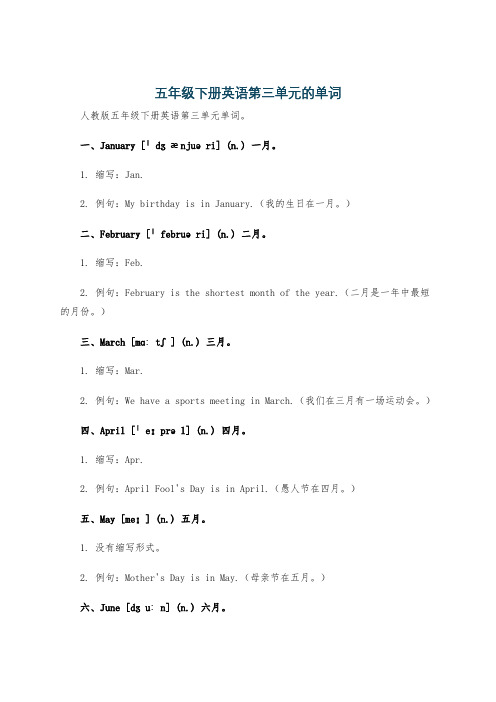
五年级下册英语第三单元的单词人教版五年级下册英语第三单元单词。
一、January [ˈdʒænjuəri] (n.) 一月。
1. 缩写:Jan.2. 例句:My birthday is in January.(我的生日在一月。
)二、February [ˈfebruəri] (n.) 二月。
1. 缩写:Feb.2. 例句:February is the shortest month of the year.(二月是一年中最短的月份。
)三、March [mɑːtʃ] (n.) 三月。
1. 缩写:Mar.2. 例句:We have a sports meeting in March.(我们在三月有一场运动会。
)四、April [ˈeɪprəl] (n.) 四月。
1. 缩写:Apr.2. 例句:April Fool's Day is in April.(愚人节在四月。
)五、May [meɪ] (n.) 五月。
1. 没有缩写形式。
2. 例句:Mother's Day is in May.(母亲节在五月。
)六、June [dʒuːn] (n.) 六月。
2. 例句:Children's Day is in June.(儿童节在六月。
)七、July [dʒuˈlaɪ] (n.) 七月。
1. 缩写:Jul.2. 例句:Summer vacation usually starts in July.(暑假通常在七月开始。
)八、August [ˈɔːɡəst] (n.) 八月。
1. 缩写:Aug.2. 例句:August is very hot in my hometown.(在我的家乡八月非常热。
)九、September [sepˈtembə(r)] (n.) 九月。
1. 缩写:Sep.2. 例句:School begins in September.(学校在九月开学。
)十、October [ɒkˈtəʊbə(r)] (n.) 十月。
五年级下册英语unit3单词
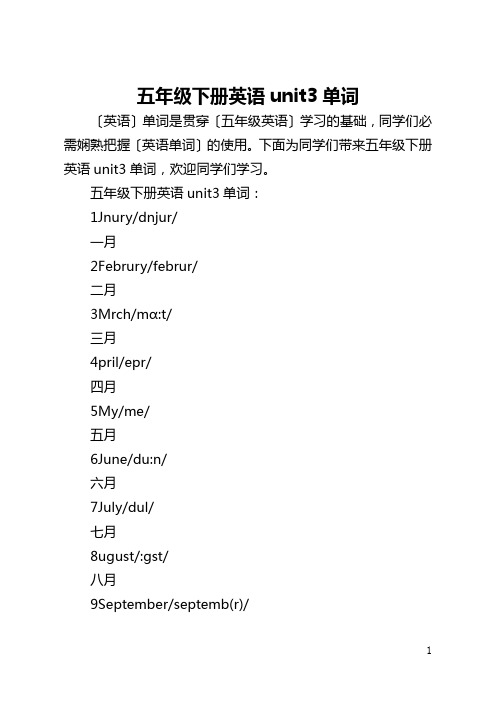
五年级下册英语unit3单词〔英语〕单词是贯穿〔五年级英语〕学习的基础,同学们必需娴熟把握〔英语单词〕的使用。
下面为同学们带来五年级下册英语unit3单词,欢迎同学们学习。
五年级下册英语unit3单词:1Jnury/dnjur/一月2Februry/februr/二月3Mrch/mɑ:t/三月4pril/epr/四月5My/me/五月6June/du:n/六月7July/dul/七月8ugust/:gst/八月9September/septemb(r)/九月10October/ktb(r)/十月11November/nvemb(r)/ 十一月12December/dsemb(r)/ 十二月13few//不多;很少few 一些14thing//事情15meet/mi:t/集会;开会16sports meet运动会17Ester/i:st(r)/复活节18trip/trp/〔旅行〕19yer/j(r)/年20plnt/plɑ:nt/〔种植〕21contest/kntest/竞赛;竞赛22the Gret Wll长城23ntionl/nnl/GJ的Ntionl Dy 国庆日24mericn/merkn/美国的25Thnksgiving/ksɡv/ 〔感恩节〕26Christms/krsms/ 〔圣诞节〕27holidy/hlde/假日;〔节日〕28gme/gem/〔游戏〕29roll/rl/滚动30look for查找31chocolte/tklt/巧克力32bunny/bni/(用作儿语)兔子33RSVP(尤用于〔请柬〕)请赐复34by/b/在之前五年级下册英语unit3单词。
人教版五年级下册英语第三单元单词
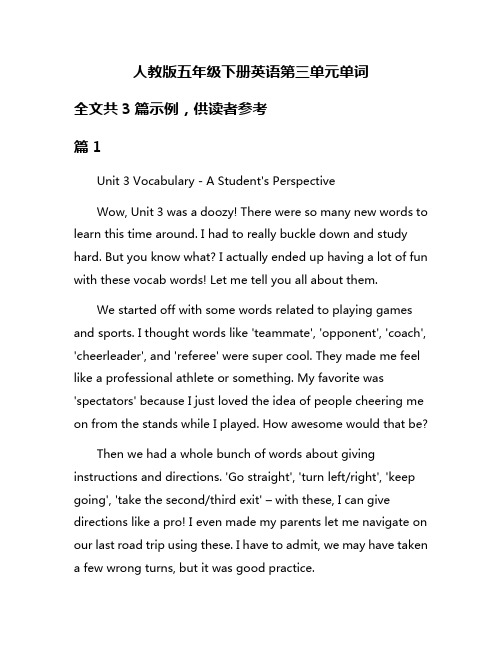
人教版五年级下册英语第三单元单词全文共3篇示例,供读者参考篇1Unit 3 Vocabulary - A Student's PerspectiveWow, Unit 3 was a doozy! There were so many new words to learn this time around. I had to really buckle down and study hard. But you know what? I actually ended up having a lot of fun with these vocab words! Let me tell you all about them.We started off with some words related to playing games and sports. I thought words like 'teammate', 'opponent', 'coach', 'cheerleader', and 'referee' were super cool. They made me feel like a professional athlete or something. My favorite was'spectators' because I just loved the idea of people cheering me on from the stands while I played. How awesome would that be?Then we had a whole bunch of words about giving instructions and directions. 'Go straight', 'turn left/right', 'keep going', 'take the second/third exit' – with these, I can give directions like a pro! I even made my parents let me navigate on our last road trip using these. I have to admit, we may have taken a few wrong turns, but it was good practice.What really blew my mind though, were the vocabulary words about inventions and discoveries. Words like 'scientist', 'experiment', 'laboratory', 'research', and 'technology' made me feel like a crazy mad scientist working on the next big breakthrough! I spent an entire weekend making up weird experiments and taking notes like a real scientist. My room was a mess, but it was the most fun I've had studying vocab in a while.Of course, we also had the usual boring everyday words like 'housework', 'iron', 'sweep', 'dust', 'laundry'. Yawn. But hey,you've got to learn those too, I guess. At least now I know what chores to ask for if I ever want to earn some allowance from my parents!I think my personal favorites from this unit, though, had to be the food words. 'Barbecue', 'delicious', 'odor', 'flavor','dessert'...just saying them out loud makes my mouth water! We actually had a little food-themed party in class where we all brought in dishes related to the new vocab words. That was probably the most delicious way to study I've ever experienced.All in all, I'd say Unit 3 was packed with some pretty awesome vocabulary. The games and sports words made me feel like a star athlete. The direction words let me be a navigation expert (well, expert-in-training). The invention words unleashedmy inner mad scientist. And the food words...mmm, let's just say they were deliciously educational!Some units are harder than others, but Unit 3 was one where I really felt like I could have fun and get creative with the new vocab. And that's what learning should be all about, right? Having a blast while expanding your mind. Sure, there were some yawners in there, but hey, you can't win 'em all. I'm definitely walking away from this one feeling more confident and excited to take on the next unit. Bring it on, Unit 4 – I'm readier than ever!篇2Unit 3 Vocabulary Words: A Student's JourneyAs a fifth-grader, learning English can sometimes feel like a daunting task, but the vocabulary words in Unit 3 of our textbook have been an exciting adventure! Let me take you through this journey, where each word has become a new friend, opening doors to a world of understanding and self-expression.The first word that caught my attention was "temperature." It's a word that we encounter daily, whether we're checking the weather forecast or feeling under the weather ourselves. Learning its spelling and pronunciation was a breeze, and now Ican confidently discuss the temperature in English, making small talk about the weather a piece of cake.Next up was "season," a word that brought vivid images of the changing landscapes throughout the year. From the blooming flowers of spring to the cozy sweaters of winter, I can now express my favorite seasons with ease, sharing my love for the warmth of summer and the crisp air of autumn.Speaking of nature, "plant" was another word that captured my imagination. I learned about the different types of plants, from towering trees to delicate flowers, and how they play a vital role in our ecosystem. Now, whenever I see a beautiful garden or a lush forest, I can describe it in English, painting a picture with words.Moving on, "animal" was a word that opened up a whole new world of fascinating creatures. From the majestic lion to the playful dolphin, I can now discuss my favorite animals, their habitats, and their unique characteristics. Who knows, maybe one day I'll become a famous animal expert and share my knowledge with others in English!But it wasn't just about the natural world; we also delved into the realm of human emotions with words like "happy," "sad," and "angry." These words allowed me to express my feelings moreaccurately, helping me communicate better with my friends and family. No more relying solely on facial expressions or gestures –I can now articulate my emotions clearly in English.And let's not forget the word "hobby," which introduced me to the world of leisure activities and personal interests. From reading books to playing sports, I can now share my hobbies with others, exchanging ideas and finding common ground with people from different backgrounds.As we progressed through the unit, words like "museum," "exhibition," and "artwork" opened my eyes to the world of art and culture. I can now appreciate and discuss various forms of art, from paintings to sculptures, broadening my horizons and fostering a deeper appreciation for creativity.Finally, the word "travel" ignited my wanderlust, sparking dreams of exploring new places and immersing myself in different cultures. I can now discuss my travel plans, share stories of past adventures, and learn about the customs and traditions of other countries, all in English.Looking back, these vocabulary words have been more than just a list of words to memorize. They have been gateways to new experiences, new knowledge, and a deeper understandingof the world around me. Each word has become a friend, a companion on this journey of learning and self-discovery.And the best part? I can now communicate in English with greater confidence and clarity, expressing my thoughts, feelings, and experiences with ease. The world has become a little bit smaller, and the barriers of language have been broken down, one word at a time.So, fellow students, embrace these vocabulary words not just as a means to an end, but as a gateway to a world of possibilities. Let them ignite your curiosity, fuel your creativity, and open doors to new adventures. Because when you master these words, you unlock the power of communication, and the world becomes your oyster, waiting to be explored and understood, one word at a time.篇3Unit 3 Vocabulary FunHi everyone! I'm really excited to share my thoughts on the super cool vocabulary words we learned in Unit 3 of our English textbook. As a fifth grader, I absolutely love expanding my English skills and discovering new words. Let me take you on a journey through this awesome unit!First up, we have the word "bottle." Now, this one might seem simple, but wait till you hear how I used it in a hilarious story! The other day, my little brother was being a total goofball and tried to bottle up his loud burps. Needless to say, it didn't work out too well, and we all ended up cracking up! Bottle is such a fun word to play around with.Next is "cotton." Cotton always reminds me of my grandma's amazing quilts. She's made so many cozy quilts out of soft cotton over the years. I love burying myself under them when I'm reading my favorite books or watching movies. The cotton word makes me feel all warm and fuzzy inside!How about "fare"? My parents are always stressing about fare prices whenever we take flights to visit my aunt in another city. They're constantly searching for the best fare deals online. I bet one day I'll be an expert at finding cheap fares for awesome travel adventures!"Hobby" is another great Unit 3 word. My biggest hobby is definitely reading fantasy novels. I can spend hours getting lost in magical worlds filled with dragons, wizards, and epic quests. Some of my friends think my reading hobby is a bit weird, but I just can't get enough of it!Then there's "hurry." This word perfectly describes how I feel whenever I'm running late for school in the morning. I'm always in such a hurry, rushing to brush my teeth, get dressed, and shove down some breakfast. I really need to work on being less of a sleepyhead so I don't have to hurry so much!Who can forget "porter"? Every time I hear this word, I picture those strong people at hotels and airports carrying huge piles of luggage for travelers. I definitely couldn't be a porter - those suitcases look super heavy! I'll stick to my reading hobby instead of lifting weights all day.How fun is the word "rob"? Not that I'd ever actually rob someone or anything! But it's kind of an exciting word when you think about those action movies where thieves rob banks and jewels. I'm just glad the most robbing I do is stealing the last few cookies from the jar before my brother can eat them."Trumpet" is simply a delightful word. It makes me imagine big, bold brass instruments belting out jazzy tunes. I've always wanted to learn the trumpet, but I'm honestly not sure if I have the lung power for all that huffing and puffing to make those loud notes!Let's talk about "wander." Whenever I'm on a nature hike with my parents, I can't help but wander off the path a bit to lookat cool plants, rocks, or animal prints. I just love exploring and letting my mind wander into imaginative adventures. My parents are always calling me back before I wander too far, though!Finally, we have "wherever." This is such a useful word for me because I'm constantly asking my mom "Can I go wherever I want this weekend?" She usually says no, but a kid can dream, right? Wherever my future takes me, I hope it involves lots of opportunities to learn new vocabulary!Well, that's my take on the amazing words we covered in Unit 3. English is just jam-packed with such brilliant, descriptive, and fun words for me to discover. I can't wait to explore even more awesome vocabulary in our future units! Thanks for reading my ramblings, fellow word nerds!。
Unit 3 单元知识必备清单五年级英语下册人教PEP版

单元知识必备清单重点词汇ask 问answer 回答eat 吃make 制造;做think 想late 晚;迟到class 班wait 等待take 拿;乘坐young 年轻的child(children)孩子(复数)quiet 安静的people 人;人们question 问题actively 积极地litter 乱丢杂物重点短语do housework 做家务go home 回家go to bed 去睡觉make noise 喧闹;制造噪音keep your room clean 保持房间清洁read in bed 在床上看书go home late 晚回家help old people 帮助老人wait for 等待pick flowers 摘花come to school early 早到学校school rules 学校规则be late for 迟到at home 在家make a mess 弄得一团乱help to do sth. 帮助做某事hold up 举起cross the street 过马路spit on the ground 随地吐痰keep off the grass 不要进入草地in front of 在……前面take good care of young children 照看好儿童play on the street 在街道上玩耍listen carefully and talk actively 仔细听并积极讨论watch TV 看电视make a list of class rules 制定一个班规清单get up 起床write some home rules for him 为他写一些家规重点句型1 Listen to the teacher carefully.认真地听老师讲课。
解读: 该句是由动词原形开头的祈使句,用于表述规则。
其否定形式是在句首直接加Don’t。
人教版英语五年级下册第三单元

人教版英语五年级下册第三单元一、单词。
1. 月份类单词。
- January(一月),缩写形式为Jan.。
例如:My birthday is in January.- February(二月),缩写形式为Feb.。
February is the shortest month of the year.- March(三月),缩写形式为Mar.。
Spring usually starts in March.- April(四月),缩写形式为Apr.。
April Fool's Day is in April.- May(五月)。
May Day is in May.- June(六月),缩写形式为Jun.。
Children's Day is in June.- July(七月),缩写形式为Jul.。
The summer vacation often starts in July.- August(八月),缩写形式为Aug.。
August is a hot month.- September(九月),缩写形式为Sep.。
School usually begins in September.- October(十月),缩写形式为Oct.。
National Day is in October.- November(十一月),缩写形式为Nov.。
Thanksgiving Day is in November in the United States.- December(十二月),缩写形式为Dec.。
Christmas is in December.2. 其他单词。
- few(不多;很少),例如:There are few apples on the tree.- a few(一些),与few不同,a few表示肯定概念。
I have a few friends here.- thing(事情),复数形式为things。
五年级下册m3单词
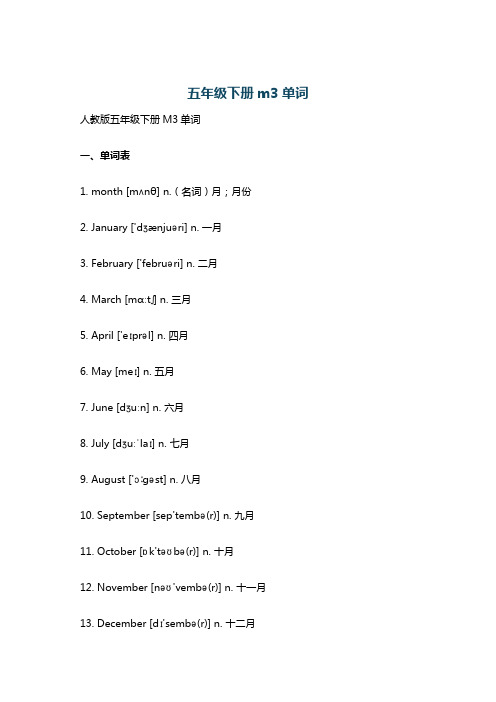
五年级下册m3单词人教版五年级下册M3单词一、单词表1. month [mʌnθ] n.(名词)月;月份2. January ['dʒænjuəri] n. 一月3. February ['februəri] n. 二月4. March [mɑːtʃ] n. 三月5. April ['eɪprəl] n. 四月6. May [meɪ] n. 五月7. June [dʒuːn] n. 六月8. July [dʒuːˈlaɪ] n. 七月9. August ['ɔːɡəst] n. 八月10. September [sep'tembə(r)] n. 九月11. October [ɒk'təʊbə(r)] n. 十月12. November [nəʊ'vembə(r)] n. 十一月13. December [dɪ'sembə(r)] n. 十二月14. few [fjuː] adj.(形容词)不多;很少15. a few 一些16. thing [θɪŋ] n. 事情;东西17. meet [miːt] v.(动词)集会;开会18. sports meet 运动会19. Easter ['iːstə(r)] n. 复活节20. trip [trɪp] n. 旅行21. year [jɪə(r)] n. 年22. plant [plɑːnt] v. 种植 n. 植物23. contest ['kɒntest] n. 比赛;竞赛24. the Great Wall 长城25. national ['næʃnəl] adj. 国家的;民族的26. National Day 国庆日27. American [ə'merɪkən] adj. 美国的 n. 美国人28. Thanksgiving [ˌθæŋks'ɡɪvɪŋ] n. 感恩节29. Christmas ['krɪsməs] n. 圣诞节30. holiday ['hɒlədeɪ] n. 假日;节日31. game [ɡeɪm] n. 游戏32. roll [rəʊl] v. 滚动33. look for 寻找34. chocolate ['tʃɒklət] n. 巧克力35. bunny ['bʌni] n.(儿语)兔子36. RSVP (尤用于请柬)请赐复(源自法语Répondez s'il vous plaît)37. by [baɪ] prep.(介词)在……之前。
人教PEP 小学英语 五年级下册 Unit3单词(带音标和例句)
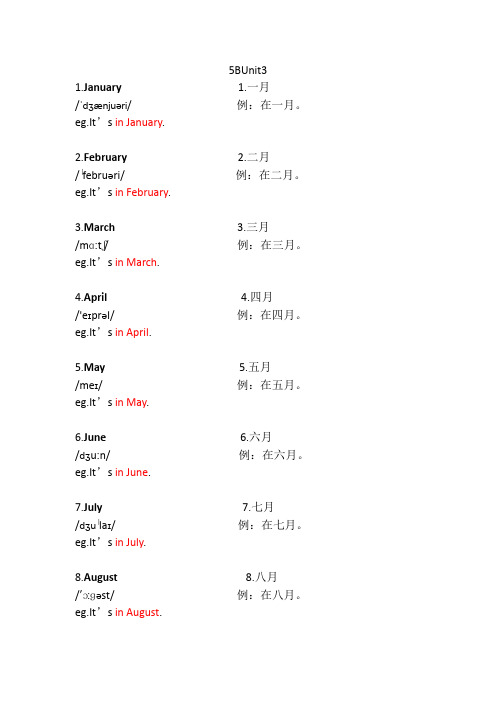
5BUnit31.January 1.一月/ˈdʒænjuəri/ 例:在一月。
eg.It’s in January.2.February 2.二月/ˈfebruəri/ 例:在二月。
eg.It’s in February.3.March 3.三月/mɑ:tʃ/ 例:在三月。
eg.It’s in March.4.April 4.四月/'eɪprəl/ 例:在四月。
eg.It’s in April.5.May 5.五月/meɪ/ 例:在五月。
eg.It’s in May.6.June 6.六月/dʒu:n/ 例:在六月。
eg.It’s in June.7.July7.七月/dʒuˈlaɪ/ 例:在七月。
eg.It’s in July.8.August 8.八月/΄ɔ:ɡəst/ 例:在八月。
eg.It’s in August.9.September 9.九月/sep'tembə(r)/ 例:在九月。
eg.It’s in September.10.October10.十月/ɒk'təubə(r)/ 例:在十月。
eg.It’s in October.11.November11.十一月/nəu'vembə(r)/ 例:在十一月。
eg.It’s in November.12.December 12.十二月/dɪ'sembə(r)/ 例:在十二月。
eg.It’s in December.13.few 13.不多;很少/fju:/ 例:一些eg.a few14.thing 14.事情/θɪŋ/例:我们有一些有趣的事情。
eg.We have a few fun things.15.meet 15.集会;开会/mi:t/ 例:运动会eg.sports meet16.Easter 16.复活节/'i:stə(r)/ 例:我们有一个复活节派对。
eg.We have an Easter party.17.trip 17.旅行/trɪp/ 例:我们有一场学校旅行。
人教版PEP小学英语五年级下册unit1至unit3知识点归纳

人教版P E P小学英语五年级下册u n i t1至u n i t3知识点归纳-CAL-FENGHAI.-(YICAI)-Company One1五年级下册Unit 1-3重点难点、单元单词、短语和知识点知识梳理第一单元知识点一、主要单词:do morning exercises晨练,做早操 eat breakfast吃早饭 have English class上英语课 play sports进行体育活动 eat dinner吃晚饭 eat lunch吃午饭 climb mountains爬山 go shopping购物,买东西 play the piano弹钢琴 visit grandparents看望(外)祖父母 go hiking去远足二、主要句子:When do you eat dinner你什么时候吃晚饭I eat dinner at 7:00 in the evening.我晚上七点吃晚饭。
When do you get up你什么时候起床I usually get up at 12:00 at noon.我通常在中午12点起床。
What do you do on the weekend你在周末干什么Usually I watch TV and go shopping.我通常看电视和购物。
Sometimes I visit my grandparents.有时候我去看望我的外祖父母。
I often play football.我经常踢足球。
Sometimes I go hiking.有时候我去远足。
三、同义词eat breakfast—have breakfast eat lunch—have luncheat dinner—have dinner play sports—do sports usually—often复数形式:policeman—policemen policewoman—policewomen现在分词:tell—telling三单:say—says同义句:What do you do ---What are you你是干什么的四、表示频度的副词:always总是,一直 usually通常,常常 often经常 sometimes有时候五、以复数形式出现的词组:visit grandparents plant trees介词后跟表示时间的词语时,表示在某年、某月、某个季节,某个时候(在上午,在下午,在晚上)用in;表示在某一天,在星期几用on,在具体的几点几分用at.七、too 和either的用法区别:too和either都是“也”的意思,但too用于肯定句,either用于否定句。
五年级下册人教版第三单元英语单词
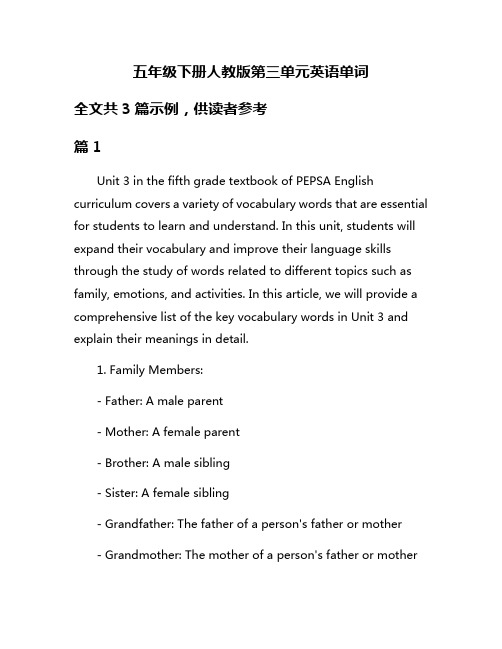
五年级下册人教版第三单元英语单词全文共3篇示例,供读者参考篇1Unit 3 in the fifth grade textbook of PEPSA English curriculum covers a variety of vocabulary words that are essential for students to learn and understand. In this unit, students will expand their vocabulary and improve their language skills through the study of words related to different topics such as family, emotions, and activities. In this article, we will provide a comprehensive list of the key vocabulary words in Unit 3 and explain their meanings in detail.1. Family Members:- Father: A male parent- Mother: A female parent- Brother: A male sibling- Sister: A female sibling- Grandfather: The father of a person's father or mother- Grandmother: The mother of a person's father or mother2. Emotions:- Happy: Feeling or showing pleasure or contentment- Sad: Feeling or showing sorrow or unhappiness- Angry: Feeling or showing strong displeasure or hostility- Excited: Feeling eager and enthusiastic- Scared: Feeling or showing fear or anxiety3. Activities:- Play: Engage in activity for enjoyment and recreation- Sing: Produce musical sounds with one's voice- Dance: Move rhythmically to music- Draw: Produce a picture or diagram by making lines and marks on a surface- Swim: Propagate oneself through water by natural means4. Adjectives:- Big: Of considerable size, extent, or intensity- Small: Of a size that is less than normal or usual- Tall: Of great or more than average height- Short: Measuring a small distance from end to end- Beautiful: Pleasing the senses or mind aestheticallyIn Unit 3, students will also learn how to use these vocabulary words in sentences to improve their speaking and writing skills. They will practice forming sentences using these words and will be encouraged to use them in everyday conversations. By mastering the vocabulary words in this unit, students will be able to communicate more effectively and confidently in English.In conclusion, Unit 3 of the fifth grade PEPSA English curriculum provides students with the essential vocabulary words they need to express themselves and communicate with others. By learning and practicing these words, students will improve their language skills and become more proficient English speakers. It is important for students to study and review these words regularly to ensure they retain them and can use them effectively in their everyday lives.篇2Unit 3 My weekendHere are some words related to the weekend in the fifth grade textbook:1. play - We play games on the weekends.2. watch - I watch movies with my family on Saturdays.3. read - I love to read books on Sundays.4. swim - We often swim in the pool on hot weekends.5. bike - I ride my bike in the park every Sunday.6. go - We go hiking in the mountains on the weekends.7. run - I like to run in the park on Saturdays.8. jump - We jump rope in the playground on Sundays.9. climb - We climb trees in the forest on weekends.10. cook - My mom and I cook dinner together on Sundays.These words are all related to the activities we do on the weekends. By learning these words, we can better express our weekend plans and experiences in English.Additionally, we can also use these words to talk about our hobbies and interests. For example, if someone asks you what you like to do on the weekends, you can say "I like to play games, watch movies, and read books." This way, you can share more about yourself and connect with others through common interests.Overall, learning these words can help us improve our English skills and communicate effectively with others. Let's keep practicing and using these words in our conversations!篇3Unit 3 WeatherWords:1. weather 天气2. sunny 晴朗的3. cloudy 多云的4. rainy 下雨的5. windy 有风的6. snowy 下雪的7. foggy 多雾的8. temperature 温度9. degree 度10. forecast 预报11. season 季节12. spring 春天13. summer 夏天14. autumn 秋天15. winter 冬天16. umbrella 雨伞17. jacket 夹克18. boots 靴子19. gloves 手套20. hat 帽子The weather is an important part of our daily lives. Knowing the weather conditions can help us plan our activities and dress appropriately for the day.Some common types of weather are sunny, cloudy, rainy, windy, snowy, and foggy. Sunny weather is bright and warm, while cloudy weather can be dull and overcast. Rainy weather means that it is raining, and snowy weather indicates that it is snowing outside. Windy weather is characterized by strong winds blowing, and foggy weather is when there is a thick fog covering the area.The temperature is another important aspect of the weather. It is measured in degrees, and the forecast usually provides information about the expected temperature for the day.There are four seasons in a year: spring, summer, autumn, and winter. Spring is the season of new beginnings, with flowers blooming and trees budding. Summer is the hottest season, perfect for beach trips and outdoor activities. Autumn brings cooler temperatures and beautiful foliage, while winter is characterized by cold weather and snow.When the weather is rainy, it is essential to have an umbrella to stay dry. A jacket can keep you warm on chilly days, and boots are necessary to protect your feet from the rain or snow. Gloves and a hat can help keep your hands and head warm in cold weather.In conclusion, understanding the different types of weather and how to prepare for them is essential for our daily lives. By learning the weather-related vocabulary, we can better communicate about the weather conditions and be ready for whatever Mother Nature has in store for us.。
五年级下册3单元单词

五年级下册3单元单词人教版五年级下册第3单元单词一、January [ˈdʒænjuəri] n.(名词)一月二、February [ˈfebruəri] n. 二月三、March [mɑːtʃ] n. 三月四、April [ˈeɪprəl] n. 四月五、May [meɪ] n. 五月六、June [dʒuːn] n. 六月七、July [dʒuˈlaɪ] n. 七月八、August [ˈɔːɡəst] n. 八月九、September [sepˈtembə(r)] n. 九月十、October [ɒkˈtəʊbə(r)] n. 十月十一、November [nəʊˈvembə(r)] n. 十一月十二、December [dɪˈsembə(r)] n. 十二月十三、few [fjuː] adj.(形容词)不多;很少十四、a few 一些十五、thing [θɪŋ] n. 事情十六、meet [miːt] v.(动词)集会;开会十七、sports meet 运动会十八、Easter [ˈiːstə(r)] n. 复活节十九、trip [trɪp] n. 旅行二十、national [ˈnæʃnəl] adj. 国家的;民族的二十一、National Day 国庆日二十二、American [əˈmerɪkən] adj. 美国的;n. 美国人;美洲人二十三、Thanksgiving [ˌθæŋksˈɡɪvɪŋ] n. 感恩节二十四、Christmas [ˈkrɪsməs] n. 圣诞节二十五、holiday [ˈhɒlədeɪ] n. 假日;节日二十六、game [ɡeɪm] n. 游戏二十七、roll [rəʊl] v. 滚动二十八、look for 寻找二十九、chocolate [ˈtʃɒklət] n. 巧克力三十、bunny [ˈbʌni] n. (用作儿语)兔子三十一、RSVP (尤用于请柬)请赐复(源自法语Répondez s'il vous plaît)三十二、by [baɪ] prep.(介词)在……之前。
